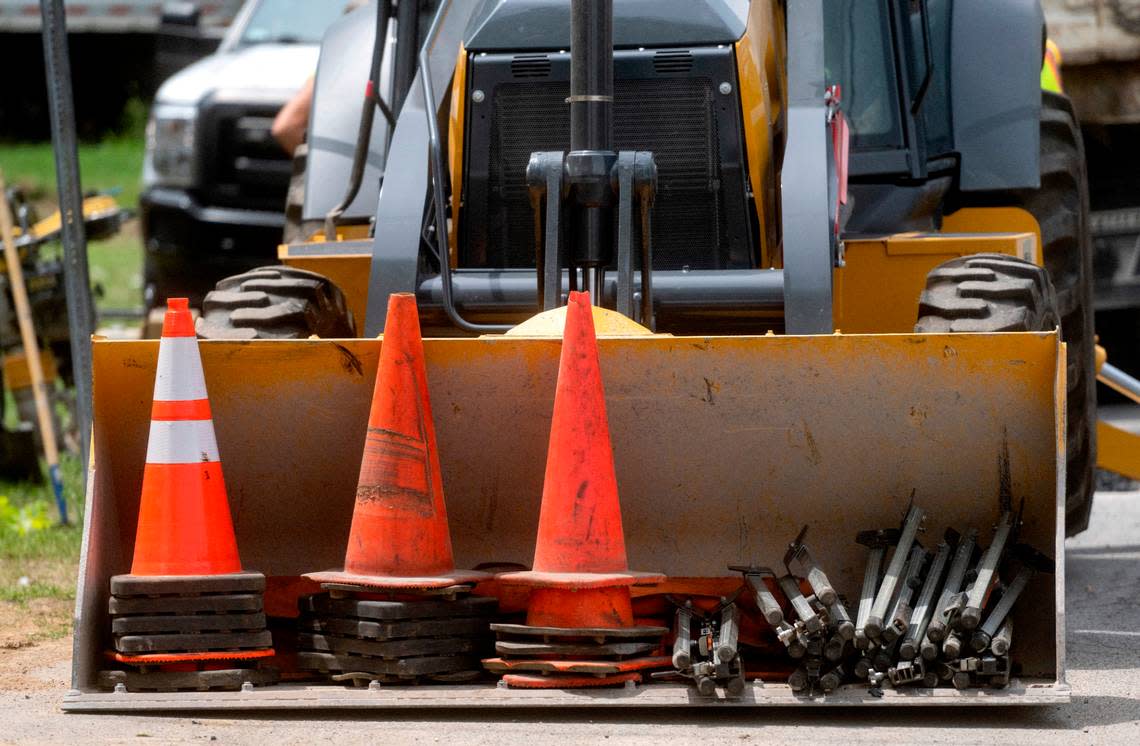Proposed contractor ordinance has spurred controversy in Centre County. What would it do?
The Centre County Commissioners will hold a public hearing next week on its proposed Responsible Contractor Ordinance before voting on the controversial measure.
The proposal has garnered a lot of attention countywide, from both supporters and in opposition, and even gained recent attention from a state representative and a candidate for Pennsylvania attorney general. The board of commissioners have been in disagreement over the RCO, split along party lines. Democrat Commissioners Mark Higgins and Amber Concepcion have been in favor of the ordinance, while Republican Commissioner Steve Dershem has not.
Below is a list of common questions and misconceptions, as well as what county and state leaders have said about the ordinance. The answers are based on the ordinance, what commissioners and others have said during public meetings, and other public events.
What does the Responsible Contractor Ordinance do?
The Responsible Contractor Ordinance, or RCO, applies only to public construction contracts with the Centre County Government over $250,000. The RCO outlines procedures for solicitation and award of some public construction contracts, provides certification requirements for public contractors and subcontractors, procedures for public contract review and assurance that such projects will use properly trained construction personnel.
The RCO was first publicly discussed by the Centre County Commissioners in January. Higgins, Concepcion — and then-Commissioner Michael Pipe — have been supportive of the ordinance, while Dershem has been opposed to the ordinance from the start.
County code requires the board to award public works contracts to the lowest responsible and responsive bidder. But because there is limited guidance on what “responsible” means, the county has proposed adopting a Responsible Contractor Ordinance with those guidelines and requirements. It would decide and define what would be responsible for Centre County.
So how would ‘responsible’ be defined?
The RCO would require the county public works contracts to be performed by “qualified responsible contractors and subcontractors” that meet criteria like satisfactory records of past performances and adequate present performance capabilities. That includes “contractor and subcontractor competency and availability of skilled craft personnel.”
Among other requirements, such as having the necessary experience, equipment, skills and such to complete the project, the ordinance would require the firm to pay all craft employees on the project prevailing wage, at minimum. The wage requirement would also apply to employees doing custom fabrication work for the project.
The contractor or person seeking the contract for a county project would need to submit a notarized Contractor Responsibility Certification, which will confirm several facts regarding its past work history and performance, and current qualifications.
The ordinance would require the county to use contractors with at least 70% of the craft labor workforce employed on the project be either journeyperson — workers who have completed an apprenticeship training program registered with/approved by the federal Department of Labor or state apprenticeship agency — or registered apprentices enrolled in such programs. A list of all the trades or classifications of craft employees that will work on the project, and names and addresses of all apprenticeship programs relating to the employees will be submitted with the certification.
Why is the county proposing the RCO and why do people support it?
John Franek, county administrator, previously told the CDT the goals of the RCO include:
Informing the county of any potential bidder non-performance issues
Encouraging/promoting worker safety and safety training
Ensuring quality county projects through recognized training/apprenticeship programs
Promoting workforce development and employment of workers within Centre County and Pennsylvania
Continue providing opportunities for smaller contractors to compete for work on county projects costing under $250,000
Creating potential cost-savings to the county and county taxpayers
Supporters of the ordinance say it will promote worker safety and support workforce development. Concepcion, during a May 23 board meeting, said the RCO would protect both the county and workers on large projects, and will ensure quality work in highly skilled technical fields is being done on county projects.
Concepcion cited a study that examined the impact on project cost with RCOs in place in Ohio, which found that they did not have a “statistically significant impact on the price of public projects,” which she said was reassuring.
Higgins said it would encourage worker safety because employers will need to certify that all the employees on the job have had their initial 10 hours of OSHA safety training, with at least one on the job site with 30 hours.
People at the state level have also started chiming in and sharing their support. State Rep. Paul Takac, D-College Township, held a press conference about it with Eugene DePasquale, candidate for Pennsylvania Attorney General earlier this month.
Takac said he’s spoken with many people who have served as elected officials in various levels of government, business officials and lawyers, and he’s heard positive impacts and benefits of RCOs, including fewer change orders, cost overruns, delays and higher quality work.
“I support the commissioners in raising this issue and look forward to a vigorous debate in the upcoming hearing. And I will add that based on my conversations with people I know and trust — folks who have direct experience in this area — I believe that an RCO can be a positive development for our county, our community, our businesses and our taxpayers. It would put people, not profits, first,” Takac said.

Why do people oppose it?
Dershem has been a vocal critic of the proposal and Republican commissioner candidate Marie Librizzi has also been an outspoken opponent.
Dershem has said in previous meetings that the ordinance is unfair and “discriminates against numerous Centre County contractors.” He said it would limit the availability of local contractors that would be able to bid on such projects, and companies that aren’t unionized or have apprenticeship programs will have to figure out how to fit their program into the ordinance.
“This is about the exclusivity of some groups of laborers and construction folks,” Dershem said earlier this month. “I want a fair, level field for everybody. I want to get the sharpest pencils out there. I want to make sure that we have the best deals, I want to make sure we get the best product at the end. And we have construction managers and bonds that make sure that occurs.”
Major construction companies have also spoke out in opposition.
Some, like Jim Willshier, director of government affairs for the Keystone Chapter of Associated Builders & Contractors, said the workforce requirement isn’t realistic. ABC has an apprenticeship program, he said, but the 70% workforce threshold is unattainable. Beyond that, he’s said a big reason they’re opposed to the ordinance is because there’s been a lack of clarity and transparency on a number of issues, including the workforce requirement and lack of definitions in the ordinance.
Worries of increased taxes and limiting competition have also been voiced at meetings, although Higgins previously said if enacted, it would not cause a tax increase.
A previous version of the proposal stated in lieu of the participation of an apprenticeship program, the county would accept a “successful resume of projects, documentation of the firm’s internal training program, roster of the trained (personnel) in its employ and submission of its safety program and Experience Modification Rate.” But the board removed that part in the third version, which is what is advertised and will be voted on.
Mike Hawbaker, of Glenn O. Hawbaker questioned that during a previous meeting.
“I guess what I am confused by … why’d you remove the EMR in there? You gave a measurement potential there to measure things upon. You continue to talk about safety, but yet you removed the EMR … so, that is confusing based on the comments stated here. Because otherwise you lack any measurement status in what you mentioned,” Hawbaker said.
What does it say about unions?
Nothing. The actual ordinance does not mention unions at all, though local union leaders have been in support of the RCO.
Oftentimes apprenticeship programs are union, and there have been concerns raised by Dershem and some Centre County residents about recent campaign donations Higgins and Concepcion received from unions during the last reporting cycle.
What projects would be affected by it?
The ordinance would only apply to public works projects undertaken directly by the Centre County Government for construction, demolition, alteration, renovation, modernization, service or maintenance of building, structures or facilities with a price tag of $250,000 or more.
This would not impact any private construction projects or public works projects done by another municipality. An upcoming Centre County Government project it would apply to, if enacted, is the renovation of the former Centre Crest building.

When would it go into effect?
Thirty days after the board votes to enact it.
Once it’s passed, can the board waive the ordinance requirements?
Yes, but only under two conditions and only for a specific project.
The county can waive the requirements of the ordinances through a resolution if the county doesn’t receive any bids for the project by the end of the bidding period, or if the county receives one bid for the project that exceeds the project budget.
When will the board vote on enacting the RCO?
The board will hold a public hearing during its regular meeting at 10 a.m. June 27 in room 146 of the Willowbank Building, 420 Holmes St., Bellefonte. The board can choose to vote on the ordinance after the hearing concludes.
The meeting room has been full the last two times the board discussed the RCO. During the last commissioners meeting, the CDT asked the board if they considered moving the meeting time and location to accommodate more people. Higgins said the public hearing “would need to be held during a time when the board of commissioners are open for business, and at that point, that would be at 10 in the morning for the regularly scheduled commissioner meeting.”
But after the meeting, Dershem said he thought they had the ability to hold the public hearing at a different time and that it was “probably a mistake” to hold it during their regular meeting.
Higgins said he expects the public hearing to be toward the beginning of the meeting.
Have other places done RCOs?
A number of other municipalities and counties have adopted Responsible Contractor Ordinances, including Bucks, Lehigh and Northampton counties.
Some opposed to the RCO in Centre County have mentioned concerns about the ordinance inviting lawsuits. In 2018 Northampton County was sued over its RCO, according to reporting by the Morning Call. But courts have since upheld the ordinance.
The Allentown City Council approved a similar RCO but later reversed course and postponed it indefinitely in 2022, according to WFMZ. The council did not respond to an inquiry from the CDT about why they decided not to move forward with it or if it is planned to be brought up again in the future.
Will municipalities in Centre County adopt an RCO?
It’s possible. At least one municipality, the State College Borough, is looking at it. Jesse Barlow, council president, said in an email to the CDT that an ordinance is being drafted and he expects it to be passed by the current State College Borough Council.
“I am a strong supporter of it,” Barlow said.
Where can I read the full ordinance?
The Centre County Government has the legal notice for the meeting, ordinance and Contractor Responsibility Certification form available for review on its website, centrecountypa.gov/167/Ordinances, or on file at the County Commissioners office in the Willowbank Building, 420 Holmes St., Room 151, Bellefonte.

